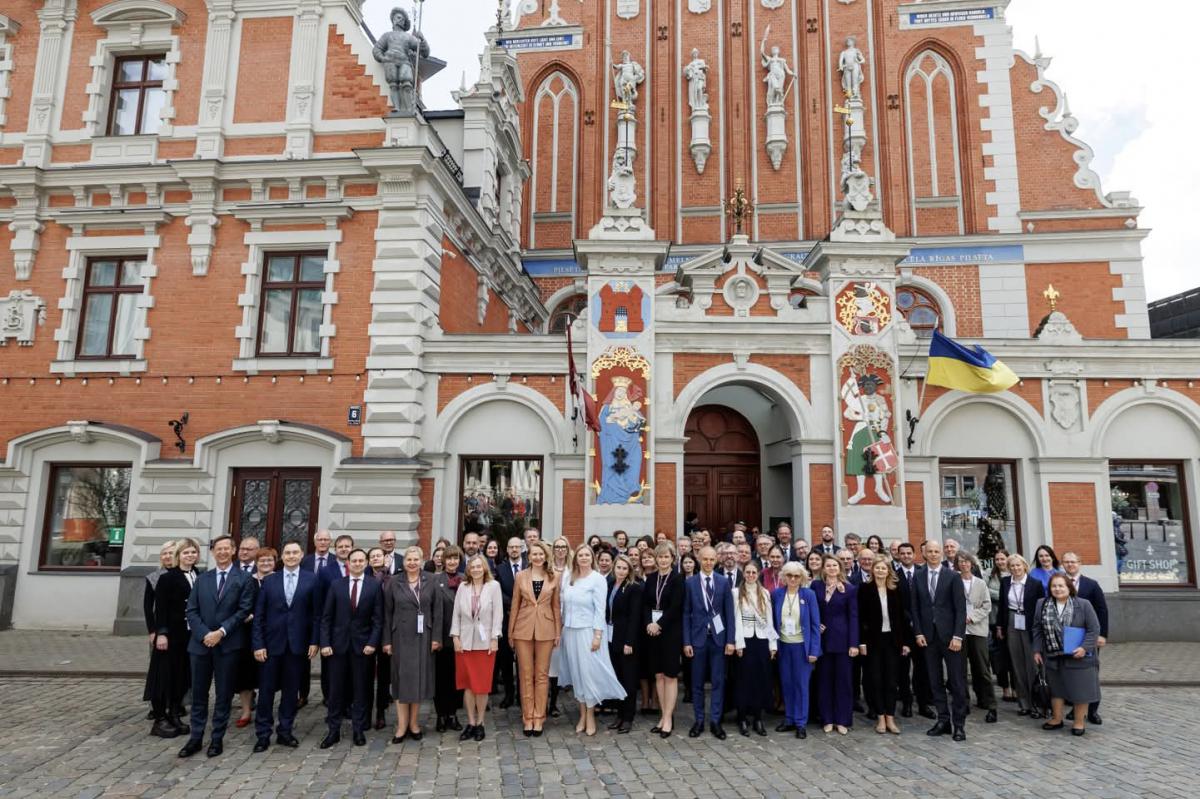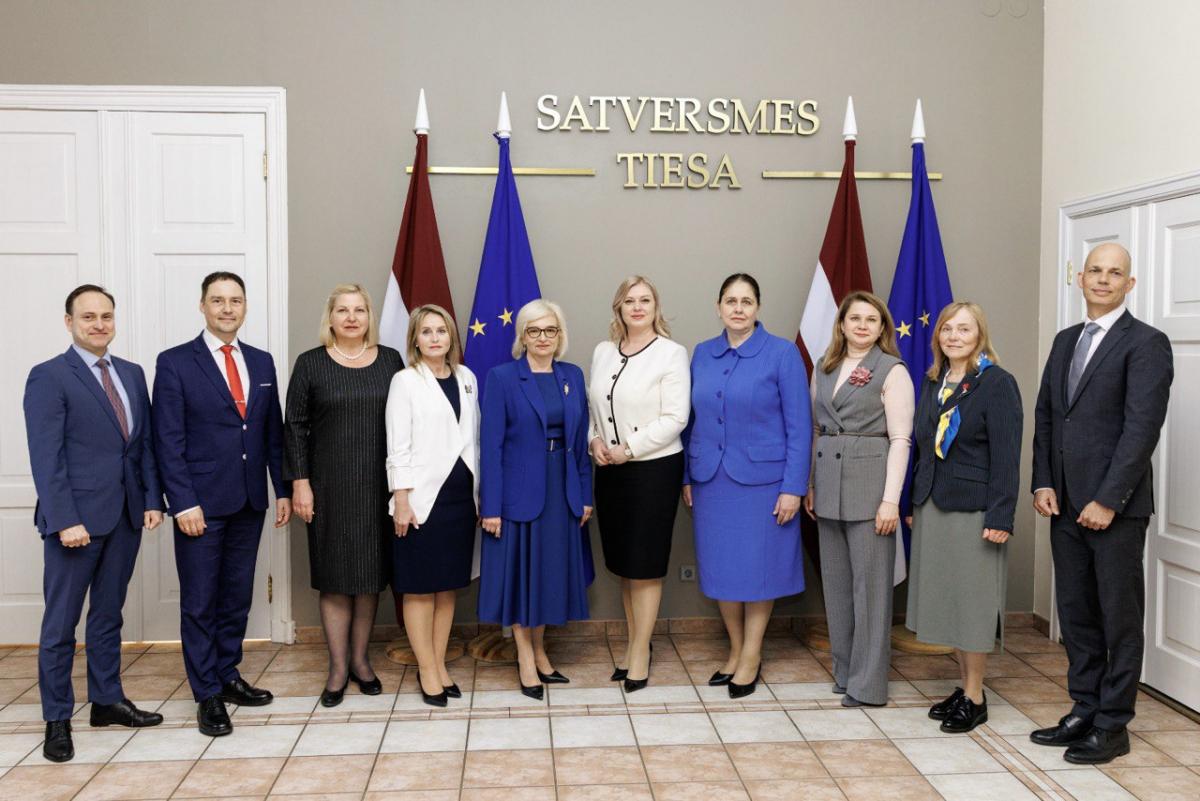29 квітня 2025 року
Proceeding with the long-standing ties and long-term fruitful cooperation between the Constitutional Court of the Republic of Latvia and the Constitutional Court of Ukraine, the delegation of the Constitutional Court of Ukraine (hereinafter, the “Court”) composed of judges of the Court Alla Oliinyk, Olga Sovgyria and Galyna Yurovska (head of the delegation) paid a working visit to the Republic of Latvia.
As part of the visit, on 24 April a bilateral meeting between the judges of the two judicial institutions took place. The Constitutional Court of the Republic of Latvia was represented by the President of the Constitutional Court Irēna Kucina, Vice-President Anita Rodiņa, Judges Jānis Neimānis, Jautrīte Briede, Veronika Krūmiņa, Mārtiņš Mits, Juris Juriss, as well as the head of administration Marika Laizāne-Jurkāne and the advisor to the President Andrejs Stupins-Jēgers. During the meeting, the parties discussed the latest institutional changes in the composition and activities of the Court, as well as exchanged experiences on recent decisions delivered by both constitutional courts.
The meeting was an important step in deepening bilateral cooperation and facilitated the exchange of experience in the field of constitutional justice.
On 25 April 2025, an International Conference on “The role of constitutional courts in ensuring the resilience of common European values in face of contemporary challenges” was held in Riga, Latvia. The event was organised by the Constitutional Court of the Republic of Latvia jointly with the EU/CoE Project “Support to the Development of Constitutional Justice in Ukraine”. The conference brought together judges of the Court of Justice of the European Union, the European Court of Human Rights, judges of constitutional courts and equivalent jurisdictions from Austria, Estonia, Greece, Ireland, Liechtenstein, Lithuania, Luxembourg, Moldova, the Netherlands, Poland, Portugal, Slovakia, Slovenia, a representative of the Venice Commission, leading lawyers and representatives of the Latvian state and judicial bodies.
The event was opened by the President of the Constitutional Court of Latvia Irēna Kucina, Minister of Justice of the Republic of Latvia Inese Lībiņa-Egnere, Acting Chairman of the Constitutional Court of Ukraine (a video address) Oleksandr Petryshyn, and Project Manager “Support to the Development of Constitutional Justice in Ukraine” Siuzanna Mnatsakanian.
Oleksandr Petryshyn expressed his sincere gratitude to the organisers of the event - the Constitutional Court of the Republic of Latvia and representatives of the Council of Europe and the European Union - for their continued support of Ukraine in the context of a full-scale war. In his address, he stressed that the Constitutional Court of Ukraine, despite the difficult conditions, including constant air alerts, continues to fulfil its main task.
In his speech, he emphasised the importance of the unity of the democratic community based on common values - respect for human rights, the rule of law, freedom and dignity.
A part of the speech was devoted to the role of experience exchange between constitutional courts as a tool for improving the effectiveness of judicial protection of human rights, as well as strengthening the constitutional order in developing countries or countries in armed conflict.
Oleksandr Petryshyn also drew attention to the need to restore trust in institutions, reform the justice system and ensure transitional justice after the war. He emphasised that Ukraine's goal is not just to win, but also to build a sustainable democracy and a state governed by the rule of law that will be a worthy member of the European legal community.
During the first panel discussion, “Challenges to democracy, the rule of law, and pluralism”, participants discussed the practice of emergency situations leading to the concentration of powers in the hands of certain institutions. It was emphasised that democratic states should have clear checks and balances in place. Participants pointed out that in the context of martial law or a state of emergency, certain restrictions on rights and freedoms may be imposed, with an indication of the duration of these restrictions. The participants paid special attention to the limits of these restrictions.
The discussion was opened by Vice President of the Venice Commission, Professor at the department of Public International Law at Charles University (Prague) Veronika Bílková.
During the event, Judge Galyna Yurovska was one of the key-speakers.
She stressed, “in times of crisis, democracies must act decisively, but they must also act with restraint. Emergencies often call for quick action, but they should not justify the continued violation of rights”.
Obviously, the judge emphasised that in a crisis or emergency, when a threat to national security arises, the ability of the parliament, government and other state institutions to assume responsibility and take the necessary measures to address it becomes extremely important.
The judge noted that even after the beginning of the full-scale invasion, Ukraine remained committed to democratic principles. Our courts remain open. Parliament is working. Civil society has mobilised not to demand less democracy, but to demand more accountability, transparency, and commitment to the rule of law.
In her speech, she stressed the importance of balancing security needs with the preservation of fundamental rights and freedoms.
In this context, Galyna Yurovska stressed the significance of legal mechanisms for restricting human rights only within the framework of the Constitution of Ukraine: “According to Article 64 of our Constitution, certain constitutional rights may be temporarily restricted under martial law”.
The judge also highlighted the key principles to which the Court adheres: “Every restriction must be justified by the Constitution and clearly set out in law”, restrictions must be temporary, and the regulatory framework must be transparent and clear. The judge emphasised that each decision of the Constitutional Court of Ukraine on the restriction of democratic freedoms is supplemented by an explanation by the state of the reasons for such restrictions, an analysis of possible risks to the rights of citizens and consequences for the state.
Among the decisions that illustrate this approach, Galyna Yurovska named ensuring access to justice, strengthening the independence of the prosecution office, restrictions on religious organisations affiliated with the aggressor state, and protection of social rights of military personnel and vulnerable groups of the population.
The judge emphasised Ukraine's steadfastness in its pursuit of European integration: “The war has made European values not just an ideal, but a practical necessity - the basis for the country's future recovery.”
She stressed that constitutional courts do not wage wars. However, they do protect the constitutional order. They preserve the space where democracy can breathe - even under threat.
Other speakers included Justice of the Constitutional Court of the Czech Republic Zdeněk Kühn, and Professor at the Law Faculty and the Centre for Transdisciplinary Gender Studies at Humboldt University Berlin, former Justice of the Federal Constitutional Court of Germany Susanne Baer.
The next panel discussion devoted to the topic “Challenges to human dignity, freedoms, and respect for human rights” was moderated by Head of the Legal Department of the Constitutional Court of the Republic of Latvia Kristaps Tamužs. The participants discussed the limits of permissible restrictions on human rights during the state of emergency, the need for effective control over these restrictions and the impact of the geopolitical context on the assessment of their constitutionality.
Judge of the Constitutional Court of the Republic of Latvia Mārtiņš Mits, Judge of the Constitutional Court of the Republic of Slovenia Matej Accetto, and Reader in Constitutional Law and Human rights, head of the Section, Birmingham Law School Alan Greene were the key-speakers of the panel.
Latvian Judge of the Court of Justice of the European Union Ineta Ziemiele presented a speech on the resilience of democratic values in times of crisis: deliberative process, judicial independence, empowered individuals as strength rather than weakness. Latvian Judge of the European Court of Human Rights Artūrs Kučs prepared concluding remarks of the conference.
The closing speeches were delivered by the President of the Constitutional Court of Latvia Irēna Kucina and Judge of the Court Galyna Jurovska, who thanked the organisers of the event, in particular, the Constitutional Court of the Republic of Latvia and the Project “Support to the Development of Constitutional Justice in Ukraine”.
In her closing remarks, Galyna Yurovska emphasised that constitutional courts play a key role in protecting human rights, ensuring the rule of law and the sustainability of democratic institutions, especially in times of crisis. She emphasised that emergencies require even greater responsibility and professionalism in decision-making.
The judge noted that Ukraine continues to prove its commitment to democratic values and legal standards, and the exchange of experience between courts from different countries contributes to the development of effective constitutional justice.
In conclusion, the judge thanked the conference participants for their support of Ukraine and contribution to strengthening democratic principles.
The event has become an important platform for sharing experience, strengthening international cooperation and discussing the current challenges faced by democratic states in the context of global crises.
Judges, scholars and experts from different countries noted that only through transparent dialogue and commitment to European values could democracy be preserved even in times of great challenge.
Інформує відділ комунікацій КСУ та правового моніторингу



